Six years ago I gave avocado to my first baby when he was 6 months old. He opened his mouth wide with excitement to eat off the spoon, spit part of it out, ate some of it, and mashed the rest in his hair. He loved eating! It was fun to watch, and yes, a mess to clean up! He started with avocado, sweet potato, squash, banana, and any fruit or vegetable we could mash. Then he tried hard-boiled egg yolks, and eventually cooked meats and grains. I loved watching his face when he tried new foods and seeing the excitement or horror from a different taste or texture. We stuck with basic foods, and he was generally content with his options. I thought, “There’s no reason to feed him anything else. He’s eating wholesome foods and nourishing his body.”
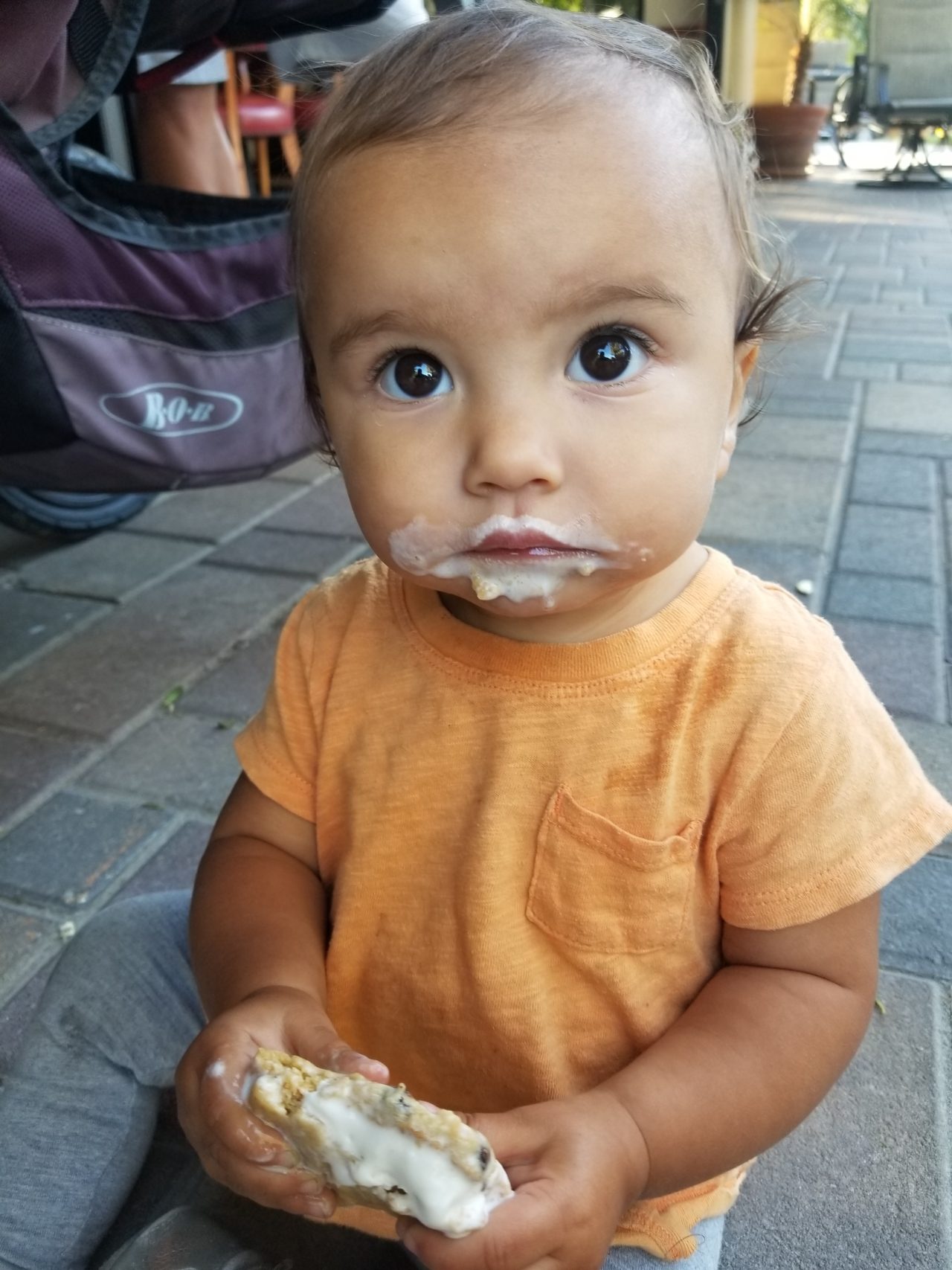
I had to learn to trust my kids with food.
It was interesting to watch myself parent in terms of food. I have a history of an eating disorder and have been recovered for over 10 years. My all foods fit mentality (barring true medical or allergic concerns) is strong as I’ve experienced the detriment of rigid food ideas and restriction. I’ve always known I want to foster a healthy relationship with food and their bodies for my kids. However, once my baby started to eat more variety, he was also introduced to foods at family functions or his mommy and me class that I hadn’t been giving him. I was not the only one supplying and exposing him to food anymore, and I couldn’t control what other people brought. I could tell him he couldn’t have certain foods or try to keep him away, but at what cost?
We were at a family barbecue around the time he turned one, and someone brought out popsicles.They were regular popsicles, the kind I grew up eating, not fruit or yogurt-based, just sugar and water with artificial flavors and food dye. My heart sank a little and I said to my husband, “Why? Why do they have to bring those around? He doesn’t need all that sugar. He’s only one.”
And my husband looked at me and answered, “because it’s fun for them to give to the kids, and it’s fun for him to have with his cousins.” Right. I remember it clear as day. Somehow I had come to terms with including all foods for myself, but when I had a child, I felt like I had to do everything to protect him and raise him perfectly, and part of that was how I handled food.
Being a new mom
Fear and intuition
I was worried about introducing sugar too early. I didn’t want him to experience intense sweetness and alter his innate and natural food preferences. After all, I had read you should start with vegetables as first foods, not fruit because fruits are sweet and they’ll only want those once introduced. They need to get used to vegetables first.
You should not do any added sugars because it will skew their perception of sweetness. You should not add breast milk to solids because it will make them think that food is sweet. I tried to follow the rules, but there were little things. I tried plain Greek yogurt for his first dairy food, and he HATED it, but with a little bit of maple syrup added, he LOVED it. To be honest, I felt a little guilty, and like I was doing something wrong by adding sweetener.
I was scared about following the rules and not “messing up” his taste buds. Instead, I was ignoring my own intuitive ability to create food he would enjoy. I was anxious in situations that were supposed to be fun and creating more stress for myself. and likely passing that energy onto him around food. When my husband responded at that barbecue, I realized I had gotten caught up in it. I was missing the forest for the trees by being more concerned about the actual food than I was about his long term relationship to it.
Knowledge vs fear
Prior to being a mom, I had read about feeding children and knew the philosophy I would follow. I had my own eating disorder experience and worked with teens who had been brought up with rigid food rules. I had read Ellyn Satter’s books and knew about the Division of Responsibility. Heck, I had even rewritten a curriculum with a colleague to teach the Division of Responsibility… but parenting fears strike like wild hyenas upon their prey. These fears are all-consuming. They take all the rational thought and knowledge you can possibly have and throw it to the wolves. Parenting fears prey on any ounce of self-doubt you’ve ever had. They’re stronger than anything I’ve ever experienced, and they pounce on every arena of raising children: food, media, school, potty training, sleep. You name it.
Fears and parenting advice
New moms are subject to a million different ideas and thoughts, and it’s hard to stay connected to intuitive forces when the world is telling you to get a guide or read a book for everything. Every other person you talk to has advice, solicited or not, to ensure your child doesn’t end up behind bars or even worse, wanting a cupcake.
Everyone is an expert!
Use baby-led weaning so they learn to self-feed. Offer pureed food or they’ll choke. Never let your kids sleep in your bed or they’ll never get out. Keep your kids in your room until they’re 6 months old. Breastfeed exclusively at all costs. Do not hold your baby too much or they’ll get used to it. Pick your baby up whenever they cry or they’ll have attachment issues. Start with veggies at 6 months. Put rice cereal in the bottle at 4 months. Give a pacifier so they can soothe by sucking. Never give a pacifier just offer the breast. And do all of this while you are healing from giving birth and only sleeping 2 to 3 broken hours a night (and on the couch if you’re me, because it was the only place I could get in the right position for breastfeeding and sleep).
So what I am saying is: that even when armed with all the knowledge and your own supply of human instinct, it’s hard to not let fear take over and drive the bus. When you want to do the absolute best for your little human it’s easy to get side-swiped and not even know it. I never thought I would have a hard time feeding my children because I knew from my lived experience and textbook knowledge what to do. But in that sugar-laden, dripping with food dye moment, I realized I was having a hard time. I was stressed about food and didn’t realize it. He was eating but I didn’t trust him to regulate outside of our normal circumstances. I was narrowing food down to its components instead of looking at the experiences and connections that can be formed with it.
To trust my kids with food I had to re-learn about feeding
He’s one. He doesn’t need the sugar.
At this point, you might be saying, “He’s one. He doesn’t NEED sugar.” I am with you. I get it! You’re right. He doesn’t NEED it. I am not advocating we all start pouring sugar on broccoli just so kids eat it or we never look at a food label to see if something has added sugar. But I will argue that we don’t need to worry about the moments we offer dessert or they have a cookie, or five, at a party.
He might not need sugar, but he also doesn’t need me to control every molecule entering his body. Nor does he need to learn some foods are bad and others are good. He doesn’t need me not trusting him. He doesn’t need me stressing about food and projecting that onto him. And I know I had been a bit stressed about it. The beginning days were fun and easy, but once he was exposed to more things I realized I didn’t really trust him to self regulate. I was scared.
We don’t live in a vacuum, and even if we did, I wouldn’t be able to control it forever. At some point he will be on his own to make food decisions, and he needs to be able to navigate his choices as a competent eater. In order to do that I had to let go. I tell you this story not to talk about sugar. It’s not about that. It is about letting go and trusting our children to feed themselves.
The Division of Responsibility is our food philosophy
I went home and pulled my Ellyn Satter books back off the bookshelf and got really clear on my role in feeding and my intentions. I realized that even though I was following the Division of Responsibility model behaviorally at home, I was not 100% trusting the process. It was amazing to see how the stress literally disappeared. All I had to do was provide food. I didn’t have to worry about what he ate, how much, or if it was balanced and perfect. That wasn’t my job. I also knew that since I was nurturing a positive relationship with food, I could let him self regulate in the real world too, without controlling it. I needed to let him experience it.
We now have three children, and I am so thankful we have come to terms with how food works in our home. I am going out on a limb to say there is close to zero stress about what the kids actually eat. I still have the regular battles of: reminding them to eat at the table, trying to add more variety, finding time to cook meals every night, getting bored of lunch box options, fighting over who gets what flavor. You know, the big things!
Food is not stress-free, but our issues around food are now about behavior and time constraints. They’re not about what they’re actually eating. We have an overall neutral environment around food. I react to them grabbing candy the same way I react to them getting out the kinetic sand and making a mess all over the kitchen table and floor right before we’re about to have company over. I don’t get upset because they’re eating sugar, but I do expect them to ask before doing something.
The Division of Responsibility in practice
When following the Division of Responsibility, as parents, we decide the what, when, and where of meals.
What: We generally offer a combination of food that includes starch, protein, fat, and produce. Many meals also include some sort of dessert type item. Snacks generally include 2-3 foods.
When: Food is provided at relatively similar times day to day, but that varies based on our schedule.
Where: We usually eat at the kitchen table but sometimes on the patio or in the living room for a movie night. My kids decide how much of the foods offered they are going to eat or if they are going to eat at all, but if they choose the latter they still need to sit with us.
We put out the food and they are in control after that. There are times when they only eat one food group, times when they eat everything, and times when they don’t eat at all.
The following are things you will likely hear me say if you hang around for a day:
- Would you like to try the green beans?
- You don’t have to eat, but you might be hungry in a bit if you don’t have anything.
- You’re welcome to have more.
- Do you want to eat more before school? You won’t be able to eat a snack for awhile.
- I know you love [bagels], but those aren’t available at this meal.
- Remind me about that food later and we’ll make sure to have it soon.
- I know you want something else, but these are the foods we’re offering tonight.
- Would you like to try the sauce on your food or have it on the side?
- You don’t have to eat it.
- This is what is available right now.
- I’ll leave your plate at the table for a bit, and if you decide to eat you’re welcome to come back.
For this last one, if we are going to be at home after breakfast or lunch, I will leave the food out when they don’t eat very much. I don’t make another meal or offer anything different. I do allow them to come back and sit at the table when they’re ready to eat.
Feeding without bribery and coercion
I find this method of feeding to be so much easier: no bribery, no forcing, no food shaming. They can’t threaten me with not eating and I can’t threaten them to eat. The energy is neutral. I honestly don’t worry if they don’t eat their vegetables or if they eat 4 pieces of bread and nothing else. It just doesn’t matter. I have seen time and time again how it balances itself out. I’m not keeping strict tabs, but there are meals when all they want is protein, or vegetables, or fruit, or grains. I have seen it happen with each individual food group. This process of allowing and observing is how I learned to trust my kids with food.
Let them have the popsicle
If this is hard for you to imagine, if you notice stress or energy around food in general, or with certain foods, ask some questions:
- Do you trust your kids with food?
- Do you trust yourself with food?
- What are your fears?
- What are your intentions in feeding your family?
- Once you are no longer providing your child’s meals, what do you hope for them in their relationship to food?
To nurture competent eaters with less stress ask yourself the questions above. Start to implement the Division of Responsibility. Create a neutral environment around food.
I encourage you to trust that children are intuitive eaters from the start. They listen to their bodies and eat what and how much they feel like. We all have that innate ability and given the opportunity, we can maintain it. Give them the popsicle, watch them lick it with joy, and revel in these moments instead of worrying. Trust them, trust the process, and feel the stress drip away, like that popsicle in all its sugary glory.
- For more, check out my online workshop: Stress-Free Family Eating: Simple Ways to Help Your Child Have a Healthy Relationship with Food


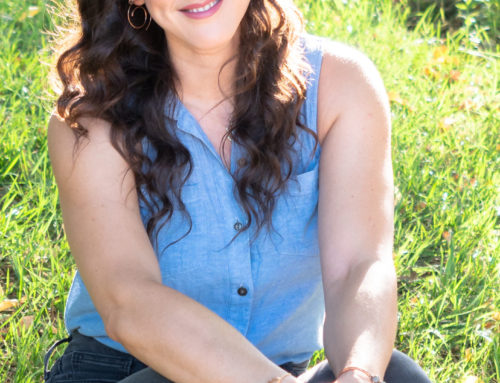
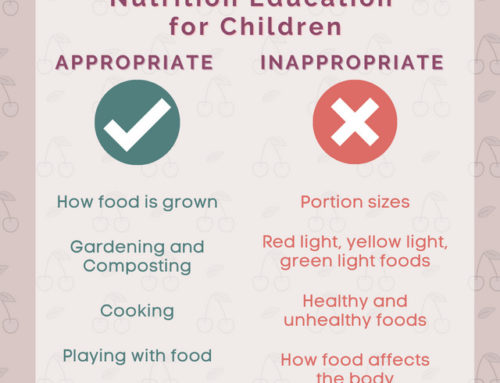
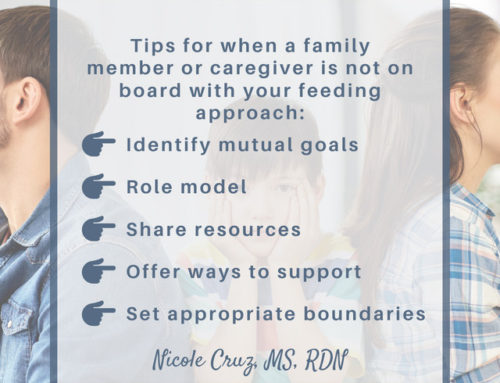
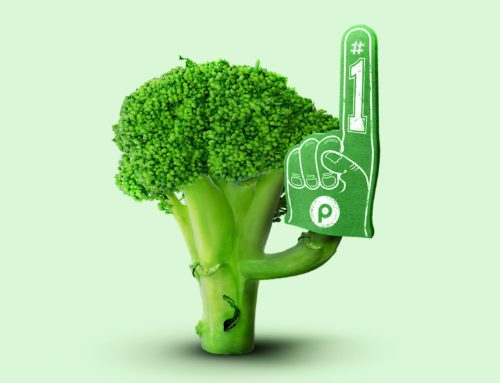
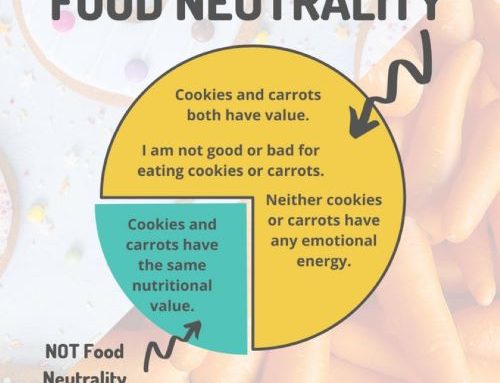
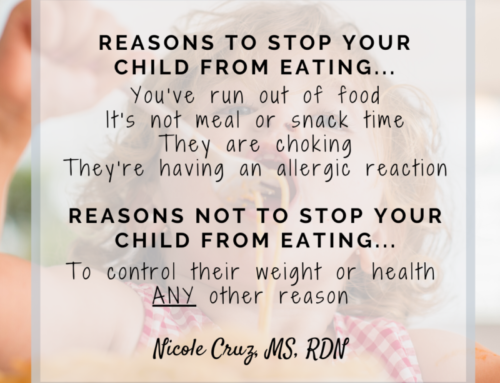
Leave A Comment